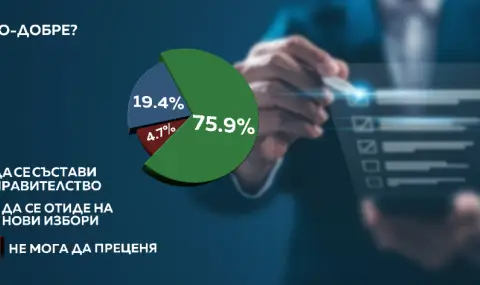The principled public opinion is against new indebtedness and high deficits. The prospect of a possible increase in taxes is frightening. The opinion about optimizing the public administration is automatically shared. The idea of new elections repels. Approval for the caretaker cabinet is in the standard negative proportions. The election of the Speaker of the National Assembly has given real hope, and Borisov's claim to be prime minister is not considered realistic. However, the idea of political isolation of Delyan Peevski's formation from consultations and other political interactions is well received.
These are some of the conclusions from an independent telephone survey by the new sociological agency “Myara“ with Juliana Galiova, Yanitsa Petkova, Svetlin Tachev and Parvan Simeonov. The survey was conducted between December 21 and 22 among 800 people and presents the opinions of the adult population of the country.
Finances
Public attitudes regarding public finances are more in favor of stability than spending. Faced with the need to choose only one of the options “It is more important that the budget focuses more on the economic stability of the country“ versus “It is more important that the budget focuses more on social assistance for citizens“, 62.4% choose stability, while 33.3% are of the other opinion. The rest hesitate. Even if we are talking about socially desirable answers, the instinct in choosing is obvious. And it means a lot against the background of the otherwise traditional social moods in our society. A clear majority of 74.6% accepts the thesis that the country is facing a real danger of serious financial turmoil. Against this background, 85.9% of those surveyed share the opinion that the state administration in our country should be reduced. This is practically public unanimity. Experimental testing of the attitude towards taking on new debts also causes public automatism: 78.6% are against. The options are not many - an alternative idea to increase VAT, for example, leads to a decrease in negativity to 56.4%. In this situation, the results related, for example, to tax breaks for restaurateurs are not surprising - they are not accepted by a majority of two to one in the percentage ratio (60.2% against versus 32.8%). Even the idea of a sharper increase in salaries for law enforcement agencies compared to others is divisive and rather repulsive: 50% negative versus 43.5% positive.
The Government
Faced with a choice between a government with compromises and new elections without compromises, 75.9% choose a government, 19.4% are of the opposite opinion. The rest are hesitant. The assessment of the caretaker government is currently 33.5% approval versus 50.1% disapproval, and this clearly further tilts the scales towards a regular cabinet. 58.1% versus 36.2% disapprove of Boyko Borisov being prime minister - even though his party won the elections. However, approval of isolating Delyan Peevski is high - 59.3% versus 35.8% approve of isolating him from consultations by President Radev or the so-called. cordon sanitaire against other interactions. Expectations are high for the new Speaker of the National Assembly, Natalia Kiselova - 68.4% see her election as a chance. Of course, at this stage, Kiselova will have to gain recognition, but the election has clearly had a hopeful effect in the political crisis.
